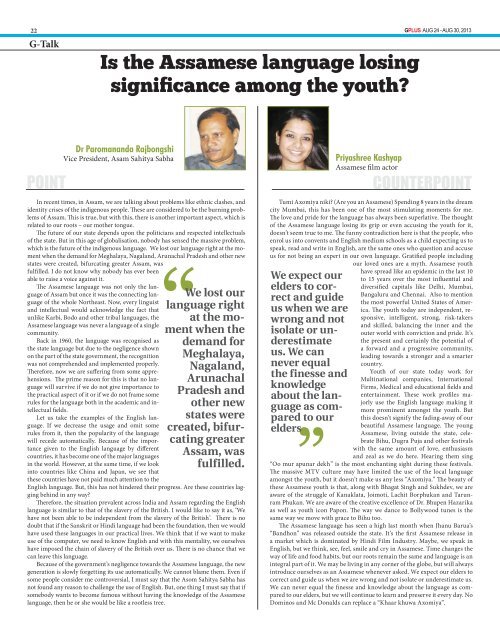You also want an ePaper? Increase the reach of your titles
YUMPU automatically turns print PDFs into web optimized ePapers that Google loves.
22<br />
G-Talk<br />
Is the Assamese language losing<br />
significance among the youth?<br />
GPLUS AUG 24 - AUG 30, 2013<br />
POINT<br />
Dr Paromananda Rajbongshi<br />
Vice President, Asam Sahitya Sabha<br />
In recent times, in Assam, we are talking about problems like ethnic clashes, and<br />
identity crises of the indigenous people. These are considered to be the burning problems<br />
of Assam. This is true, but with this, there is another important aspect, which is<br />
related to our roots – our mother tongue.<br />
The future of our state depends upon the politicians and respected intellectuals<br />
of the state. But in this age of globalisation, nobody has sensed the massive problem,<br />
which is the future of the indigenous language. We lost our language right at the moment<br />
when the demand for Meghalaya, Nagaland, Arunachal Pradesh and other new<br />
states were created, bifurcating greater Assam, was<br />
“<br />
fulfilled. I do not know why nobody has ever been<br />
able to raise a voice against it.<br />
The Assamese language was not only the language<br />
of Assam but once it was the connecting language<br />
of the whole Northeast. Now, every linguist<br />
and intellectual would acknowledge the fact that<br />
unlike Karbi, Bodo and other tribal languages, the<br />
Assamese language was never a language of a single<br />
community.<br />
Back in 1960, the language was recognised as<br />
the state language but due to the negligence shown<br />
on the part of the state government, the recognition<br />
was not comprehended and implemented properly.<br />
Therefore, now we are suffering from some apprehensions.<br />
The prime reason for this is that no language<br />
will survive if we do not give importance to<br />
the practical aspect of it or if we do not frame some<br />
rules for the language both in the academic and intellectual<br />
fields.<br />
Let us take the examples of the English language.<br />
If we decrease the usage and omit some<br />
rules from it, then the popularity of the language<br />
will recede automatically. Because of the importance<br />
given to the English language by different<br />
countries, it has become one of the major languages<br />
in the world. However, at the same time, if we look<br />
into countries like China and Japan, we see that<br />
these countries have not paid much attention to the<br />
We lost our<br />
language right<br />
at the moment<br />
when the<br />
demand for<br />
Meghalaya,<br />
Nagaland,<br />
Arunachal<br />
Pradesh and<br />
other new<br />
states were<br />
created, bifurcating<br />
greater<br />
Assam, was<br />
fulfilled.<br />
English language. But, this has not hindered their progress. Are these countries lagging<br />
behind in any way?<br />
Therefore, the situation prevalent across India and Assam regarding the English<br />
language is similar to that of the slavery of the British. I would like to say it as, ‘We<br />
have not been able to be independent from the slavery of the British’. There is no<br />
doubt that if the Sanskrit or Hindi language had been the foundation, then we would<br />
have used these languages in our practical lives. We think that if we want to make<br />
use of the computer, we need to know English and with this mentality, we ourselves<br />
have imposed the chain of slavery of the British over us. There is no chance that we<br />
can leave this language.<br />
Because of the government’s negligence towards the Assamese language, the new<br />
generation is slowly forgetting its use automatically. We cannot blame them. Even if<br />
some people consider me controversial, I must say that the Asom Sahitya Sabha has<br />
not found any reason to challenge the use of English. But, one thing I must say that if<br />
somebody wants to become famous without having the knowledge of the Assamese<br />
language, then he or she would be like a rootless tree.<br />
Priyashree Kashyap<br />
Assamese film actor<br />
COUNTERPOINT<br />
Tumi Axomiya niki? (Are you an Assamese) Spending 8 years in the dream<br />
city Mumbai, this has been one of the most stimulating moments for me.<br />
The love and pride for the language has always been superlative. The thought<br />
of the Assamese language losing its grip or even accusing the youth for it,<br />
doesn’t seem true to me. The funny contradiction here is that the people, who<br />
enrol us into convents and English medium schools as a child expecting us to<br />
speak, read and write in English, are the same ones who question and accuse<br />
us for not being an expert in our own language. Gratified people including<br />
our loved ones are a myth. Assamese youth<br />
We expect our<br />
elders to correct<br />
and guide<br />
us when we are<br />
wrong and not<br />
isolate or underestimate<br />
us. We can<br />
never equal<br />
the finesse and<br />
knowledge<br />
about the language<br />
as compared<br />
to our<br />
elders<br />
“<br />
have spread like an epidemic in the last 10<br />
to 15 years over the most influential and<br />
diversified capitals like Delhi, Mumbai,<br />
Bangaluru and Chennai. Also to mention<br />
the most powerful United States of America.<br />
The youth today are independent, responsive,<br />
intelligent, strong, risk-takers<br />
and skilled, balancing the inner and the<br />
outer world with conviction and pride. It’s<br />
the present and certainly the potential of<br />
a forward and a progressive community,<br />
leading towards a stronger and a smarter<br />
country.<br />
Youth of our state today work for<br />
Multinational companies, International<br />
Firms, Medical and educational fields and<br />
entertainment. These work profiles majorly<br />
use the English language making it<br />
more prominent amongst the youth. But<br />
this doesn’t signify the fading-away of our<br />
beautiful Assamese language. The young<br />
Assamese, living outside the state, celebrate<br />
Bihu, Dugra Puja and other festivals<br />
with the same amount of love, enthusiasm<br />
and zeal as we do here. Hearing them sing<br />
“Oo mur apunar dekh” is the most enchanting sight during these festivals.<br />
The massive MTV culture may have limited the use of the local language<br />
amongst the youth, but it doesn’t make us any less “Axomiya.” The beauty of<br />
these Assamese youth is that, along with Bhagat Singh and Sukhdev, we are<br />
aware of the struggle of Kanaklata, Joimoti, Lachit Borphukan and Tarunram<br />
Phukan. We are aware of the creative excellence of Dr. Bhupen Hazarika<br />
as well as youth icon Papon. The way we dance to Bollywood tunes is the<br />
same way we move with grace to Bihu too.<br />
The Assamese language has seen a high last month when Jhanu Barua’s<br />
“Bandhon” was released outside the state. It’s the first Assamese release in<br />
a market which is dominated by Hindi Film Industry. Maybe, we speak in<br />
English, but we think, see, feel, smile and cry in Assamese. Time changes the<br />
way of life and food habits, but our roots remain the same and language is an<br />
integral part of it. We may be living in any corner of the globe, but will always<br />
introduce ourselves as an Assamese whenever asked. We expect our elders to<br />
correct and guide us when we are wrong and not isolate or underestimate us.<br />
We can never equal the finesse and knowledge about the language as compared<br />
to our elders, but we will continue to learn and preserve it every day. No<br />
Dominos and Mc Donalds can replace a “Khaar khuwa Axomiya”.

















